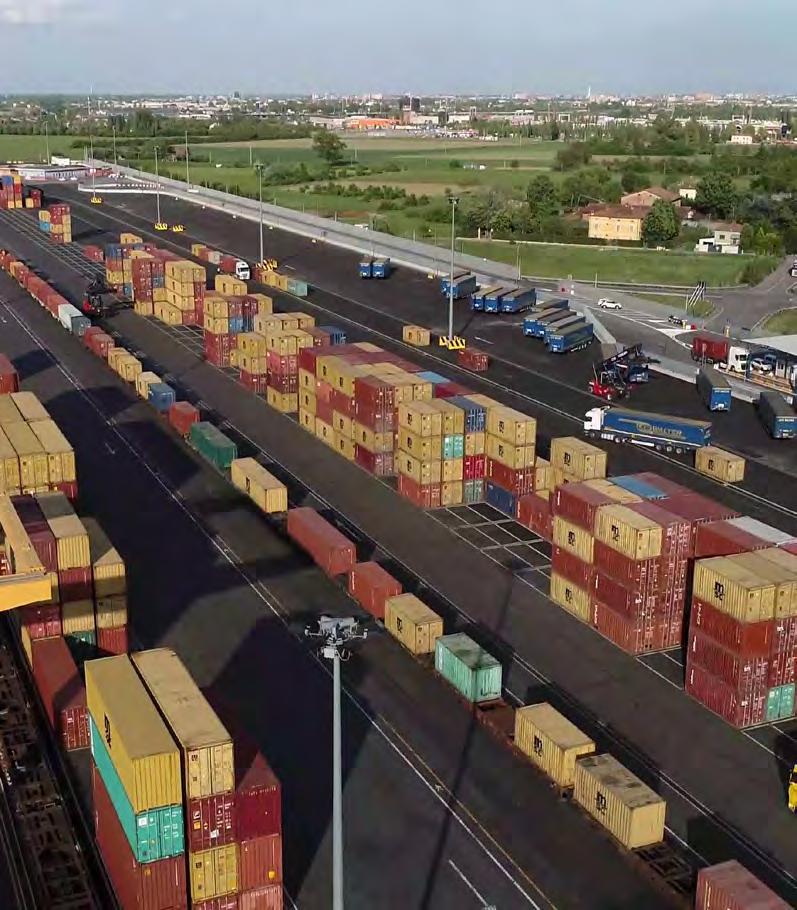
3 minute read
Integrated logistic
(102-1, 102-4, 102-6, 102-7, 102-43, 102-44)
INTEGRATED LOGISTICS
* Roughly 21.9 billion tonne-km, including 10.7 abroad * Roughly 43 trains-km, including 18.3 abroad
TRAINS
INDUSTRY LOGISTIC STATION
DESTINATION
* Integrated logistics hub - Mercitalia group * Companies in Italy, Germany,
Greece * Integrated logistic platforms
THE GROUP INTENDS TO PRESENT ITSELF AS AN INTEGRATED LOGISTICS OPERATOR, BOTH IN ITALY AND ABROAD, CONTRIBUTING TO IMPROVING THE FREIGHT TRANSPORT SYSTEM AND PROMOTING THE MODAL SHIFT: FROM ROAD TRANSPORT TO RAIL, WITH FEWER SOCIAL REPERCUSSIONS (ACCIDENT RATE, TRAFFIC CONGESTION) AND ENVIRONMENTAL REPERCUSSIONS (LOWER ATMOSPHERIC EMISSIONS AND LESS ENERGY CONSUMPTION).
The Group’s commercial offer77 is based on a wide range of Italian and international connections. It satisfies the needs of the different product sectors, which has also entailed structuring a business unit which guarantees less time-to-market for customers:
NATIONAL FREIGHT TRANSPORT
INDUSTRY
Services for steel, chemicals and automotive industries Complete selection of railway and logistics solutions dedicated to the transport of containers, mobile homes, semi-trailers and lorries Transport for manufacturing and work sites, products for large-scale distribution and military transport
INTERMODAL GENERAL
INTERNATIONAL FREIGHT TRANSPORT
At international level, the Group offers logistics and rail solutions in Austria, Denmark, France, Germany, Greece, Norway, the Netherlands, Poland, Romania, Sweden and Switzerland. The main goods sectors to which the Group offers dedicated services are: chemical, wood and paper, raw materials, mining, agriculture and automotive
77) Mercitalia hub, the Group’s freight segment, is led by Mercitalia Logistics and is composed of: Mercitalia Rail, which is Italy’s largest rail freight company; TX Logistik group, which is Germany’s second-largest railway freight carrier, operating in many other European countries as well; Mercitalia Intermodal, Italy’s largest combined road/rail transport operator, and the third largest in Europe; Mercitalia Transport & Services, which specialises in road freight transport and value-added logistics; Mercitalia Shunting & Terminal, one of the largest intermodal terminal operators in Italy, which designs, creates and maintains freight connections and rolling stock shunting and maintenance services, including intermodal inland terminal operations; and TerAlp (Terminal AlpTransit), which specialises in building cutting-edge terminal infrastructures.
FOR THE FIRST TIME IN 2021, ALL MERCITALIA COMPANIES CONDUCTED A CUSTOMER SATISFACTION SURVEY USING THE SAME METHOD.
Customer centrality is a fundamental value for all Mercitalia companies. The companies ensured the following in 2021 in order to meet customer needs:
* providing tailor-made services; * delivering flexible transport solutions that are efficient and competitive; * forging valuable company/customer relationships to ensure adequate, timely and customised offers; * innovating and developing strategic drivers, combined with updating the Mercitalia group’s vehicles and infrastructures. Specifically, the level of satisfaction with the services provided was assessed via an online questionnaire involving customers representing at least 70% of transport revenue. Customers rated Mercitalia’s overall services 7.0 out of 10, calculated as the average score given to the different companies. This demonstrated the customers’ appreciation of the group’s efforts to offer a service of increasingly higher quality and focused on their needs.
The Group’s commitment to carefully handling complaints in order to provide services that are increasingly tailored to its customers’ needs extends to the freight segment as well. All complaints received from customers are handled by investigating the causes behind the inefficiency and providing a prompt response to the customer, indicating any corrective measures if possible. Mercitalia Rail received 95 complaints in 2021, slightly up on the previous year (+13%) partially justified by the difficult situation in general (pandemic) which made planning and operating management of transport complicated due to the fluctuating demand. Roughly 90% of complaints received a response within the set timeframe and the main causes for complaint were management of inefficiencies and traceability of transport when abroad (an IT project is currently being rolled out to set up a new global track & trace system to resolve this latter issue).









